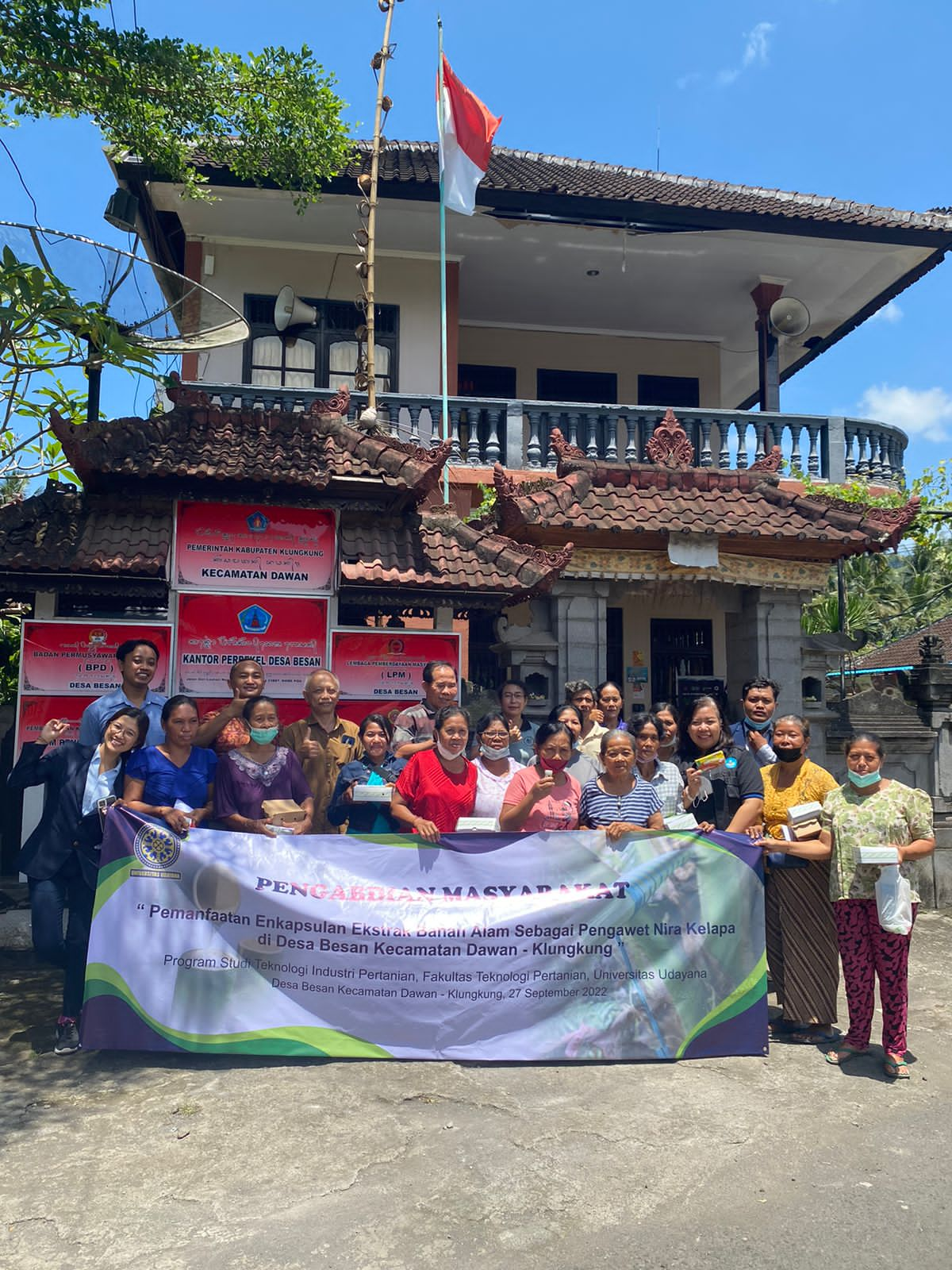Implementing Research Results in the Community, the entire Lecturer Team of the Agroindustrial Technology Study Program Devoted to the Utilization of Encapsulations as a Preservative of Coconut Sap in Besan Village, Klungkung
The entire Community Service Team of Lecturers of the Agroindustrial Technology Study Program consisting of Ir. Ida Bagus Wayan Gunam, MP., Ph.D., I Made Mahaputra Wijaya, ST., M.Sc., Dr. Eng., Dr. Anak Agung Made Dewi Anggreni, S.TP., M.Sc., Ni Putu Suwariani, S.TP., M. Biotech, together with a lecturer at the Faculty of Mathematics and Science, Dr. Dra A. A. S. Alit Sukmaningsih K., M.Repro has carried out community service on Tuesday 27th September 2022. Community service was carried out in Besan Village, Klungkung with the title "Utilization of Natural Ingredients Extract Encapsule as Preservative Coconut Sap in Besan Village, Dawan District, Klungkung ". This activity was also attended by employees of the Faculty of Agricultural Technology, namely I Wayan Wisma Pradnyana Putra, S.TP., alumni I Gede Arya Sujana, S.TP. and student Ni Kadek Ratningsih Dewi Parwati. This service activity was attended by the Head of Besan Village, Babinsa, and participants of nira craftsmen to be processed into Balinese sugar.
Besan Village, Dawan District, Klungkung Regency is known as the highest producer of coconut sap in Bali, but ineffective sap handlers cause the sugar content in the sap to be low when or has been fermented before being processed into liquid sugar, palm sugar, solid sugar (coconut sugar). and wine. The problem obtained from the development of this product is the lack of public knowledge about the process of preserving coconut sap when tapping the sap. In addition, the availability of large quantities of coconut sap in Besan Village needs to be developed to increase the selling value and increase the income of the local community. The previous handling process still looks very simple, only relying on natural ingredients, so that some of the sugar content in the sap is converted into alcohol and acid. Departing from this problem, the entire service team of Lecturers of the Agroindustrial Technology Study Program provided training and counseling to overcome these problems.
Team Leader Mr. Ir. Ida Bagus Wayan Gunam, MP., Ph.D., reports that with the problems that exist in sap farmers, one solution is the use of natural ingredients that have the potential to preserve coconut sap or inhibit the proliferation of microbes that convert sugars into other compounds that are not harmful. It is desirable that derivative products such as liquid sugar, palm sugar, solid sugar (coconut sugar) and as raw materials for making arak drinks are desired. Coconut sap that has high quality eat its derivative products will be able to meet export standards. In addition, it can increase food diversification which will increase the diversity of food in Indonesia. He also added that the service program that will be implemented and becomes a priority is counseling on the handling and preservation of sap and the practice of handling raw materials and how to use natural ingredient extract encapsulates as natural preservatives. He also added that research on the encapsulation of natural ingredient extracts had been carried out through the PUU Grant which was received by the team. He also reported that the encapsulated extract of natural ingredients can be used as a preservative for coconut sap. This is because the bioactive compounds in the extracts of natural ingredients such as catechins, leukoantioasins and gallic acid, caffeic and chlorogenic acids and the esters of these acids, namely 3-galloilepicatechin, encapsulated phenylcafeate can inhibit microbial activity that often contaminates coconut sap, so it can be expected to inhibits the conversion of sugars they contain into acids, alcohols and other compounds and ultimately maintains the quality of sap and its derivative products.










